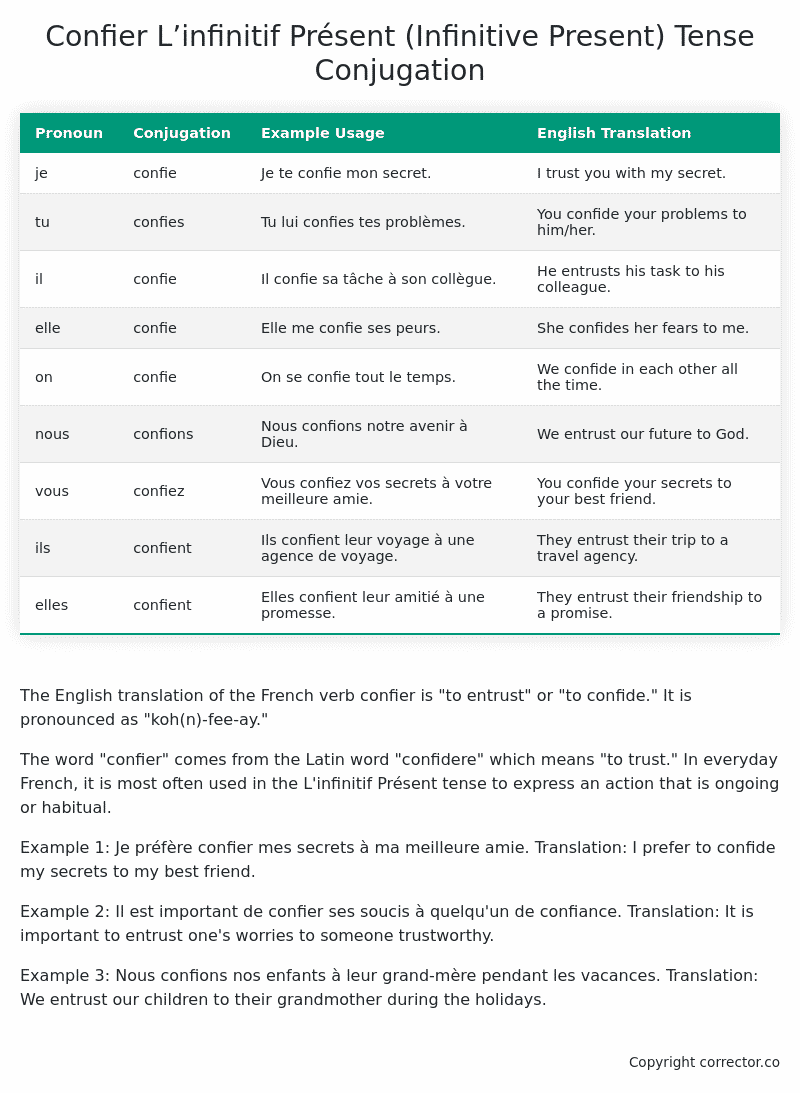L’infinitif Présent (Infinitive Present) Tense Conjugation of the French Verb confier
Introduction to the verb confier
The English translation of the French verb confier is “to entrust” or “to confide.” It is pronounced as “koh(n)-fee-ay.”
The word “confier” comes from the Latin word “confidere” which means “to trust.” In everyday French, it is most often used in the L’infinitif Présent tense to express an action that is ongoing or habitual.
Example 1: Je préfère confier mes secrets à ma meilleure amie.
Translation: I prefer to confide my secrets to my best friend.
Example 2: Il est important de confier ses soucis à quelqu’un de confiance.
Translation: It is important to entrust one’s worries to someone trustworthy.
Example 3: Nous confions nos enfants à leur grand-mère pendant les vacances.
Translation: We entrust our children to their grandmother during the holidays.
Table of the L’infinitif Présent (Infinitive Present) Tense Conjugation of confier
| Pronoun | Conjugation | Example Usage | English Translation |
|---|---|---|---|
| je | confie | Je te confie mon secret. | I trust you with my secret. |
| tu | confies | Tu lui confies tes problèmes. | You confide your problems to him/her. |
| il | confie | Il confie sa tâche à son collègue. | He entrusts his task to his colleague. |
| elle | confie | Elle me confie ses peurs. | She confides her fears to me. |
| on | confie | On se confie tout le temps. | We confide in each other all the time. |
| nous | confions | Nous confions notre avenir à Dieu. | We entrust our future to God. |
| vous | confiez | Vous confiez vos secrets à votre meilleure amie. | You confide your secrets to your best friend. |
| ils | confient | Ils confient leur voyage à une agence de voyage. | They entrust their trip to a travel agency. |
| elles | confient | Elles confient leur amitié à une promesse. | They entrust their friendship to a promise. |
Other Conjugations for Confier.
Le Present (Present Tense) Conjugation of the French Verb confier
Imparfait (Imperfect) Tense Conjugation of the French Verb confier
Passé Simple (Simple Past) Tense Conjugation of the French Verb confier
Passé Composé (Present Perfect) Tense Conjugation of the French Verb confier
Futur Simple (Simple Future) Tense Conjugation of the French Verb confier
Futur Proche (Near Future) Tense Conjugation of the French Verb confier
Plus-que-parfait (Pluperfect) Tense Conjugation of the French Verb confier
Passé Antérieur (Past Anterior) Tense Conjugation of the French Verb confier
Futur Antérieur (Future Anterior) Tense Conjugation of the French Verb confier
Subjonctif Présent (Subjunctive Present) Tense Conjugation of the French Verb confier
Subjonctif Passé (Subjunctive Past) Tense Conjugation of the French Verb confier
Subjonctif Imparfait (Subjunctive Imperfect) Tense Conjugation of the French Verb confier
Subjonctif Plus-que-parfait (Subjunctive Pluperfect) Tense Conjugation of the French Verb confier
Conditionnel Présent (Conditional Present) Tense Conjugation of the French Verb confier
Conditionnel Passé (Conditional Past) Tense Conjugation of the French Verb confier
L’impératif Présent (Imperative Present) Tense Conjugation of the French Verb confier
L’infinitif Présent (Infinitive Present) Tense Conjugation of the French Verb confier (this article)
Struggling with French verbs or the language in general? Why not use our free French Grammar Checker – no registration required!
Get a FREE Download Study Sheet of this Conjugation 🔥
Simply right click the image below, click “save image” and get your free reference for the confier L’infinitif Présent tense conjugation!

Confier – About the French L’infinitif Présent (Infinitive Present) Tense
Forming the Infinitive Present
Common Everyday Usage Patterns
As a Verb’s Dictionary Form
After Modal Verbs
As an Imperative
In Infinitive Clauses
Interactions with Other Tenses
Present Tense
Future Tense
Conditional Tense
Passé Composé
Imperfect Tense
Subjunctive and Conditional Moods
Summary
Want More?
I hope you enjoyed this article on the verb confier. Still in a learning mood? Check out another TOTALLY random French verb conjugation!


